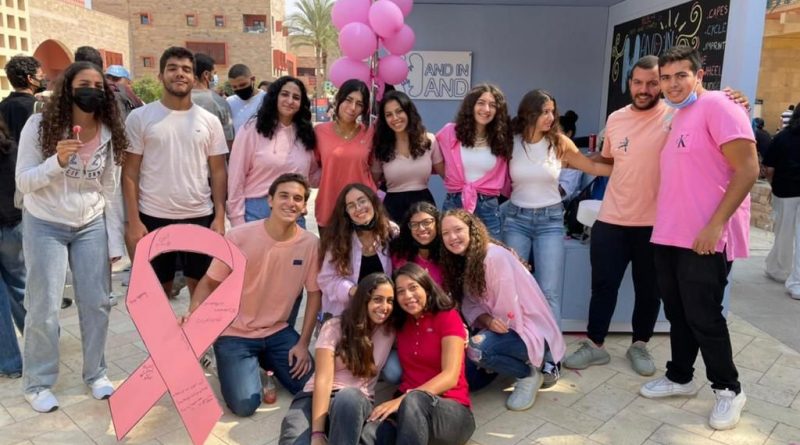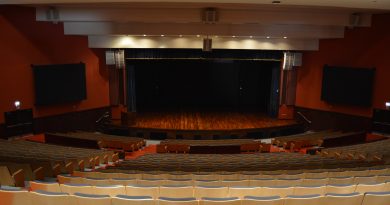Breast Cancer: Young Women Should Get Checked, Too
By: Janna Adel
@janna_adel21
Photo courtesy Hand in Hand
Several student clubs at AUC have been campaigning on the ground and online to raise awareness about breast cancer and the importance of getting early checkups.
October was the National Breast Cancer Awareness Month (BCAM), during which annual campaigns were organized by global charities and organizations to raise awareness and funds for research.
Computer Science junior and Hand in Hand club Head Nadine Wael explained her club’s goals to inform students about the illness. This included on-ground activities on campus to combat the myths surrounding the disease.
“Right now, we are working on a collaboration with Swvl [Egyptian bus transportation network company] where anyone heading to or from Baheya Hospital will get a 30 percent discount on their ride,” Wael told The Caravan.
“We are trying to help girls, who can’t help themselves and [who] are seeking help from us through emotional support like sending out supportive messages, entertainment and donations in the form of clothes and food, [but] which most of the time is money, ” said Wael.
In the meantime, Integrated Marketing Communication (IMC) senior Noha Hossam, who lost her grandmother to breast cancer, decided to share her story as a form of inspiration – and warning – for every student on campus.
“I would define breast cancer as someone who creeps on you or your loved one and suddenly robs the life out of them if they are not caught early on. It is very hard to get back what you have lost,” added Hossam.
Hossam’s mother and aunts got a mammogram checkup; however, she is under the impression that she is too young to get hers.
“Egyptian culture believes that getting a checkup when you are perfectly healthy is a way of ‘attracting’ the illness to yourself when actually you are just being cautious,” said Hossam.
Unfortunately, it was not the first time the breast cancer (BRCA) gene mutation appeared in Hossam’s family as her great-grandmother also suffered from the same illness.
According to the National Breast Cancer Foundation (NBCF), despite what their names might suggest, BRCA genes do not cause breast cancer, these genes typically play a significant role in preventing breast cancer.
But when a gene becomes altered or broken, it does not function correctly and is called a gene mutation. Data from the NBCF shows that one in every 400 people carries the mutated BRCA genes, which means they are no longer effective at repairing broken DNA.
As a result, people with a BRCA gene mutation are more likely to develop breast cancer. The carrier of the mutated gene can also pass a gene mutation down to their offspring.
According to the World Health Organization’s International Agency for Research on Cancer, new breast cancer cases accounted for 32.2 percent of all cancer cases among women in 2020. Other organizations, such as the American Society of Clinical Oncology (ASCO), have put this figure at nearly 39 percent.
Hossam stresses that fearing and ignoring breast cancer will not make the risk of having it go away. She added that she will seriously think about getting an early checkup and advised other young women her age to do the same.
Early detection does save lives.
Director of AUC’s New Cairo Clinic Bassem Gamil explained that it is uncommon for those in the student age group to get regular check ups for breast cancer unless there is a family history of it.
“If there is a family history of breast cancer, it’s recommended to seek clinical examination every six months starting [at] 10 years before the age at which the youngest family member was diagnosed with the disease,” said Gamil.
If a student’s mother was diagnosed with breast cancer at 35 years, for example, the daughters in the family should get medical checkups as early as the age of 25.
But the mammogram is not covered in the insurance plan provided by AUC to its students.
“If the treating consultant gave the student a written recommendation of a mammogram due to a reasonable justification, then the insurance would cover it,” said Gamil.
In August 2021, the Egyptian Ministry of Health reiterated its calls for women to seek early detection tests of breast cancer and emphasized that 60 percent of breast cancer cases detected early do not need chemotherapy.
Electronics and Communication Engineering senior and Mashroo3 Kheir (Goodness Project) club President Ahmed Fouad explained that their breast cancer awareness campaign is to foster a culture where regular checkups are seen as important not only for the individuals, but also for their families.
“We want students to be more educated about breast cancer, mainly learning how to do a breast cancer self-check and the importance of getting an early check-up,” Fouad said.
Adjunct Faculty in the Psychology Department and Professional Counselor Noha El Nahas says that reluctance in getting a checkup does not only impact the quality of life of only one person, but also affects the lives of the people around them.
“Breast cancer is no joke, it is curable especially when caught at early stages, and the earlier you know the better,” she said.




